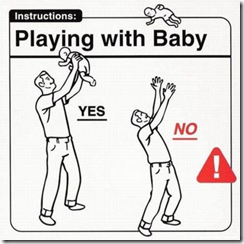Matthew Dicks's Blog, page 431
November 24, 2013
Look! An airplane! Amazing! Also the Toyota Camry you just plowed into.
It’s clever. Genius, even. But I worry about the kind of interactive billboard that distracts the driver’s eyes from the road any longer than necessary.
Oy. I sound like an old man.
November 23, 2013
Juicing is dumb. But I didn’t say it.
This may come as a surprise, but every so often, I don’t write something in fear that it may offend readers.
I know. Based upon some of the things that I’ve written in the past, can you imagine how awful these things must be in order for me to avoid saying them?
Here’s an example:
Last week I wanted to write a piece about juicing. Specifically, I noticed that almost everyone I know who is juicing or has juiced in the past are lost souls who lack sufficient self esteem, self confidence or direction in life. They tend to be people who latch onto every latest fad, dietary or otherwise, in a desperate attempt to find the missing piece of a puzzle that’s missing more pieces than they know or are willing to admit.
I realized that I have yet to meet a confident, happy, successful, satisfied juicer. While this may sound a little ridiculous, it isn’t an entirely crazy notion. Juicers often talk about the mental awaking and spiritual enlightenment that comes with juicing. Juicing programs have names like Renovation, Excavation, Glow, Clean, and LOVE Deep. While the idea that juicing can do any of these things is nonsense, it explains why everyone who juices secretly despises their lives:
Happy, confident people don’t need to glow. They don’t require any spiritual awakening. They are not seeking renovation, excavation or love at the bottom of a bottle.
No one juices because they like juice. They juice to become better people.
This, of course, is absurd.
While the idea that all juicers feel like this admittedly an exaggeration, it’s a slight one at best.
But I opted not to write this piece, in fear that I might offend juicers everywhere. Perhaps there are some truly self-actualized juicers who don’t think the world is treating them unfairly. There may be juicers in the world who don’t feel undervalued, ignored, underutilized and under confident.
Perhaps there are some happy juicers out there after all.
But I chose not to write the piece, feeling like doing so would only annoy a large segment of people.
Less than a week later, Katy Waldman of Slate wrote the damn thing for me. Her piece, entitled Stop Juicing: It’s not healthy, it’s not virtuous and it makes you seem like a jerk, attacks juicing on a number of levels, and while she doesn’t spend as much time on the psyche of the juicer as I might have, she feels essentially the same about juicing that I do:
It’s stupid. And if you’re doing it, shut up about it. No one cares.
I just wish that I had said it first.
November 22, 2013
Lessons learned from 4 years of parenting
Two years ago, when my daughter was two, I created a list of lessons that I had learned from two years of parenting. Two years and an additional child later, I’ve added to the list based upon additional experience.
The list may someday become a framework for a book or memoir. For now, I hope it can helpful to new parents in need of some guidance and encouragement.
______________________________________
The parent who assumes the tougher position in regards to expectations and discipline is almost always correct.
Almost every behavior is temporary. Remembering this is key to avoiding frustration.
Almost every temper tantrum can and should be ignored.
The calmer the household, the calmer the child.
Avoid becoming emotionally attached to your child’s inappropriate behaviors whenever possible. They are almost never about you.
Writing to your child on a daily basis helps you better appreciate the moments with your little one and prevents you from wondering why times flies by so quickly.
There are extremely few critical and uncorrectable mistakes that you can make with your child.
With exceptions, training your child to fall sleep on her own in her own bed and sleep through the night takes about two weeks if done with tenacity, an iron will and an absolute adherence to the advice of experts. Parents must also possess the grudging acceptance that thunderstorms, nightmares and illness will upset the apple cart from time to time.
You cannot take too many photographs of your child.
Despite their size, it’s almost impossible to impose your physical will on any toddler without risking harm to them. Find another way.
Reading to your child every single night without exception is an easy but critical critical commitment that every parent must make.
Changing a diaper is not a big deal and is never something worthy of whines or complaints.
Toddlers will invariably have a million things to tell you as soon as you begin an important telephone call. Lock yourself in a room or go sit in the car before dialing.
Experienced parents always know which toys are best.
Toddlers cannot distinguish between a new toy and a used toy. Accept all hand-me-down toys with gratitude, knowing they were once well loved and can be loved again.
Unsolicited advice from experienced parents should always be received with appreciation. It should not be viewed as a criticism or indictment of your own parenting skills and can be easily ignored if need be.
There is absolutely no reason for a child under eighteen months old to be watching television on a daily basis.
Consignment shops are some of the best places to find children’s clothing and toys unless you are a pretentious snob.
Parents seeking the most fashionable or trendy stroller, diaper bag, and similar accouterments are often saddled with the least practical option.
Little boys and little girls are entirely different animals. They have almost nothing in common, and it is a miracle that they might one day marry each other.
The ratio of happy times to difficult times in the first four years of your child’s life is about one billion to one. Some parents have an unfortunate tendency to forget the billion and accentuate the one.
I’ve also separated out three rules out that are closely interconnected and exceptionally important for expecting parents and the parents of newborns to understand.
Taking care of a child during the first four years of life is not nearly as difficult as many people want you to believe.
Telling people that raising your child has been an easy and joyous experience will often annoy them. Do it anyway.
Experienced parents who are positive, optimistic and encouraging to the parents of newborns are difficult to come by and should be treasured when found.
November 21, 2013
My son’s first steps (and a gentle shove)
My son took his first steps yesterday. We managed to capture a few of them on video. A day later, I still get goose bumps just thinking about it.
In truth, Charlie could’ve walked a couple days earlier, but my wife and I had a deal (the same deal we had with our daughter):
If it looks like he’s about to take his first steps but either one of us is not present, push him over and prevent him from taking the steps until we’re both there.
That, my friends, is true love.
Verbal sparring: Extreme self-flagellation
A friend told me that she recently utilized an argumentative tactic that she watched me use with great success last year and suggested that I share it with others.
So here goes:
At the end of the previous school year, a colleague was upset with me for my failure to strictly comply to a policy related to her department. When she called to discuss this issue, one of my students answered the telephone, and because I was in the middle of a lesson, I told the student to take a message. The colleague insisted that she speak with me, so I instructed my student to hang up on her.
Nothing comes between me and a good math lesson.
As you might expect, my colleague was exceptionally angry, and with good reason. I knew that she would be calling back at some point, so I carefully planned my defense.
When she called back the next day at lunch time, I was ready. Before she could speak, I launched into an explanation about how I was entirely at fault in this situation and accepted full blame. I went on to describe myself as an awful, inappropriate, unprofessional, disrespectful person who didn’t deserved to be treated with a even a modicum of respect. I said that I was a bad person, a bad teacher and a terrible role model for my students. I went on and on for a full five minutes, finding new and creative means of self-flagellation, until my colleague was forced to interject and defend me against myself.
“Don’t be ridiculous,” she said. “You’re an amazing teacher. Your kids love you.”
“No,” I said. “I’m not. The way I treated you in this situation makes that obvious. I’m despicable.”
“This isn’t a big deal, Matt. Don’t be so hard on yourself.”
We went back and forth for a while. I insisted that I was a rotten person. She insisted that I was making a big deal out of nothing. I offered enormous and outrageous concessions. She refused each other, insisting that no concessions were required.
In the end, my colleague never had the opportunity to lodge a single complaint about me. She never expressed a single negative emotion. She spent the entire phone call insisting that I was a good person and a great teacher.
When you can force your detractor into defend you against yourself, you have won the day.
November 20, 2013
How many male authors, after speaking brilliantly about writing and literature, have been asked publicly about their clothes?” I have an answer, but I suspect that some of you will want to chop my head off for it.
Author M. Molly Backes recently asked the following question on Twitter:
@mollybackes: How many male authors, after speaking brilliantly for an hour about writing and literature, have been asked publicly about their clothes?
It’s a fair question. Let me first go on the record as saying that I don’t support questions like this in any way.
Actually, that’s not true. I support these kinds of questions in full when hey are asked of me. I specifically request that audiences to ask me challenging, odd and unique questions, related or unrelated to my books, and I reward them with prizes for doing so. I love questions that confound and confuse me me. They often lead to interesting exchanges and the opportunity for me to tell often untold stories.
The only clothing-related question I was ever asked was “Boxers or briefs?” But that lady wanted the prize badly. I don’t think she possessed any genuine curiosity about my underwear.
All that said, I’d like to suggest that the reason that male authors don’t receive questions about their clothing is rather simple:
While there are exceptions to this rule, fashion as a conversational topic tends to be dominated by women.
Men rarely speak about their clothing, and women speak about it often.
Having spent the last fifteen years in an elementary school where more than 90% of my friends and colleagues are women, and having also attended an all women’s college prior to that, I’ve grown the understand the dichotomy in male and female communication well.
I’m actually writing a book about it with a sociologist.
What’s become exceptionally clear to me after all these years is that women (not all, but a great majority) speak about fashion and physical appearance a lot. They compliment one another on their clothing. They remark on new hair styles. They comment on shoes and jewelry. They admire boots and scarves. They ask about the origins of specific articles of clothing with incredible frequency. In fact, the typical response to a compliment like, “I love that sweater,” is “Thanks, I got it as such and such a place.”
Comments about fashion and physical appearance are a large part of female socialization. It’s a topic that is mentioned often.
This is a reason that fashion magazines are written primarily for women.
This is the reason that two of the most popular fashions in the country, Marie Claire and Elle, actually have women’s names.
This is a reason that I am the only man I know who watches Project Runway. More than 80% of the show’s audience is female. And the percentage of women who watch the Academy Award’s red carpet fashion preshow are even higher.
Women talk fashion. Not all of them, but in comparison to men, the number is huge. Clothing is a female topic of conversation.
This is simply not the case for men. We almost never discuss or ask about clothing. This is not meant to imply that men’s topics of conversation are more sophisticated or erudite than women. Just different.
So while it’s inappropriate, rude and ridiculous to ask a female author about her clothing during the Q&A portion of her book talk, it also makes perfect sense that if someone is going to be asked, it’s going to be a female author and not a male author.
No one, man or woman, ever asks me about my clothing, on or off the book circuit. I don’t ask anyone about their clothing. It’s just not a realm in which men frequently operate.
Before you chop my head off for making such assertions, consider this:
A female author spends an hour talking to her audience. She is engaging, informative and amusing. The audience asks pertinent and insightful questions. Everyone is happy.
Ten minutes later, that same female author is sitting at a nearby table, signing books. A female reader approaches. She hands over a book for the author to sign, compliments the author on her work, describes her favorite part of the story, and then says, “By the way, I love your sweater? Did you knit it yourself?”
“No,” the author says. “I only wish I could knit something like this.”
“It’s beautiful,” the reader says. “Where did you get it?”
This exchange would seem perfectly normal to both the author and the reader. No one would think twice about it.
But now try to imagine the same exchange if either the author or the reader (or both) were male. It would almost never happen. But with two women, the conversation seems commonplace and unremarkable.
While it’s inappropriate to ask the same question about the sweater in the middle of the author’s presentation, it’s important to note that we’re not talking about an entirely inappropriate question. We’re only talking about a matter of timing.
Asking the question during the presentation is not good. Asking it after the presentation is fine.
It should also be remembered that the reader who asks the clothing question during an author’s presentation does so for a reason, and it’s not necessarily meant to be demeaning. Perhaps the questioner simply wants to know something about the author’s wardrobe and is unable to delay gratification. Maybe she’s nervous about being in the presence of someone who she admires and isn’t thinking straight. Maybe she’s a person who doesn’t understand the societal norms and expectations attached to an author talk. Or perhaps she feels unjustifiably friendly and even intimate with the author after having read her book and listened to her speak.
This happens to me all the time. People who I don’t know feel like they know me well.
Regardless of the reason, asking the question during the talk a bad decision, but it’s not an example of sexism. It’s asked because it’s a woman speaking to a woman, and when women speak, fashion is often used as a conversational lubricant.
It has nothing to do with respecting a male author over a female author. It’s just poor timing.
How many male authors, after speaking brilliantly for an hour about writing and literature, have been asked publicly about their clothes?
Not many. Almost none, I suspect. But no one ever asks us about our clothing. I can’t remember the last time a person, make or female, commented on my fashion choices. It only makes sense that I wouldn’t be asked questions like this during an author talk. I never receive them in real life.
On the other hand, I’m frequently asked about my favorite sports teams, my golfing handicap, my wife, and the books that husbands and boyfriends might enjoy.
I know that I’m asked these questions because I am a man. It is assumed (rightfully so) that I enjoy watching sports. It’s assumed (and rightfully so) that I play sports. It’s assumed that I read books that the typical man would enjoy. I may have read the latest Jennifer Weiner or Ann Patchett novel, but no one gives a damn about my opinion on those books. No one ever asks me to recommend a good beach read, a romance novel or a tear jerker, either.
Can you guess why?
It’s because I’m a man. No one asks me these kinds of questions in my real life, so why would I expect them to start at a book talk?
I understand why a female author would be offended by a question related to her clothing, and she has a right to be annoyed. It’s not the time or place for such questions, but it’s probably not because the person asking the question is sexist or thinks any less of female writers.
She’s probably just a woman, and fashion is something that women speak about often. If the same question were asked five minutes after the talk, it would probably be greeted with a smile.
There’s no reason to feel belittled or insulted by such questions.
Annoyed? Sure.
Offended? If you must.
But not belittled. Yes, you’re being asked the question because you’re a woman (and the person asking is likely a woman), but it has nothing to do with your ability as an author.
It’s simply a common topic of conversation amongst women.
November 19, 2013
At least we don’t throw knives at our children
Next time someone older than me complains that my generation (and subsequent generations) lack manners or spend too much time on our phones or don’t save enough money, I’ll say, “At least we don’t throw knives at our children for fun.”
Every generation has something to be embarrassed about, as I rather aggressively pointed out to an older gentleman last week.
This one is pretty horrifying.
November 18, 2013
My TED Talk (if you listen closely)
On Saturday, I gave a TED Talk on Creativity and Compassion at Western Connecticut State University. It was an interesting conference that was sponsored by the school’s Center for Compassion, which was launched earlier this year after the Dalia Lama visited the school.
Once the video has been edited and published, I will post it here.
Back in August of this year, I gave another TED Talk on Education and Innovation at the AT&T Conference Center in conjunction with Center for 21st Century Skills. Unfortunately (and incredibly frustratingly), the sound on the recording was poor.
I can’t tell you how annoyed I am.
I hope to give this talk again at another TED conference, but until now, this is all I have, poor sound and all.
I did not like Doris Lessing’s response to winning the Nobel Prize
I was saddened to hear about the death of Doris Lessing. I read a lot of her work while in college and some of her short stories since then.
I like her work a lot.
That said, I wasn’t a fan of her response to winning to Nobel Prize back in 2007. While nonchalance can be charming and a disinterest in competition can seem noble, this is the Nobel Prize. Out of respect for all those who came before her and all those who toil for a lifetime in hopes of achieving this level of recognition, I thought it was disrespectful to dismiss the news of her win so offhandedly and follow it up by stating that “I’ve won all the prizes in Europe. Every bloody one,” as if none of them matter anymore.
I felt like the reporter understood the importance of this win better than she did.
Also, and perhaps more importantly, what the hell is hanging on the neck of the person who was in the car with her? And what is in his hands?
November 17, 2013
The greatness of Guess the Animal and the stupidity of Freeze Tag.
After running around the house ten thousand times playing tag with my daughter and exhausting myself, it’s always good to know that I can stop all the chasing with a suggestion that we play a game called Guess the Animal.
Whoever taught my daughter this simple game was a genius. I’d give you a hug if I knew who you were.
I’d like to do something decidedly different to the person who taught my daughter to play the two person version of Freeze Tag.
Freeze Tag was always a stupid game. The two person version is downright idiotic, and yet it’s my daughter’s favorite game at the moment.











